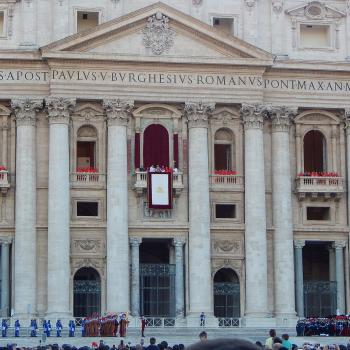The year 2008 was a financial 9/11, only the damage was not limited to the United States. The whole world suffered. Now, mired in debt, nations are in crisis and consumers are making matters worse. They have decided buying things on credit may not be such a good idea in uncertain times. They are saving money, depriving the consumer-driven economy of its fuel. Many technical explanations for the crisis have been given, but the underlying problems that feed all the technical ones are simple: false gods. Yes. The false gods of the unfettered Free Market and Consumerism. Happiness, American culture shouts daily, is to be found in the accumulation of material things. Shopping is America's official, patriotic activity, President Bush told us after 9/11. Spend, don't save. Buy now, pay later. Take the waiting out of wanting. And don't forget, greed is good.
What happens when self-restraint, humility and modesty go out the window, and the monthly measure of all socio-economic goodness is the ringing cash register at the mall, and the teachings of one of Islam's most revered prophets, Jesus of Nazareth, are transformed at Christmas into sales statistics? Emir Abd el-Kader's struggle to live righteously in war and peace tells us of a Muslim world hero whose life demonstrated the power of Jesus Christ's admonition "to love not the things of this world."
For a Western secular culture mired in materialism and the pursuit of things, Abd el-Kader reminds us of some of its loftier spirits: of Ralph Waldo Emerson's notion that a man is rich in proportion to the number of things he doesn't need, of Antoine Saint-Exupery's famous line in his fanciful children's story, The Little Prince, "What is essential is invisible to the eye." Not exactly slogans for the consumer society.
For the Muslim world, the editor of the Pakistani monthly Al-Sharia, Muhammed Nasir, summarized the emir's importance when reviewing Commander of the Faithful:
First, he never was overwhelmed by blind zeal and fight at all costs and was capable of making wise judgments. Secondly, he is strictly guided in his decisions by the legal limitations and moral obligations of Divine Law—he knows when it is permissible to kill Christians and when to risk his own life to save them. Thirdly, despite his political animosity toward France, he is not blind to what is common between their religion and his own...and finally, he can put himself in his adversaries shoes and look into the complexities of the situation and understand the factors that make them follow a certain course. Abd el-Kader is not only a symbol of resistance and struggle against foreign domination, but the embodiment of true theological, moral and rational ideas taught by Islam.
In other words, the emir possessed four qualities that contributed to his greatness: self-control, duty to higher law, recognition of communality amidst difference and an unusual ability to empathize, even with his adversaries—qualities in short supply throughout today's world.




